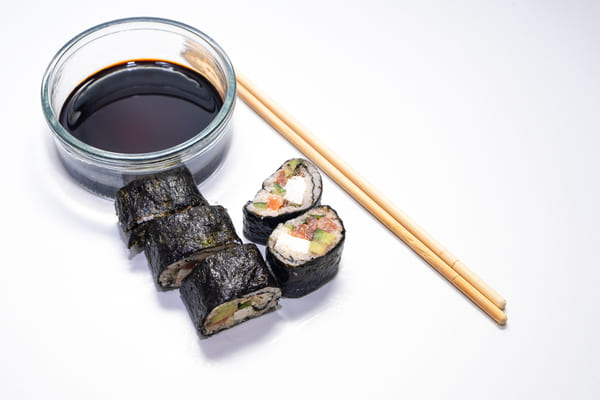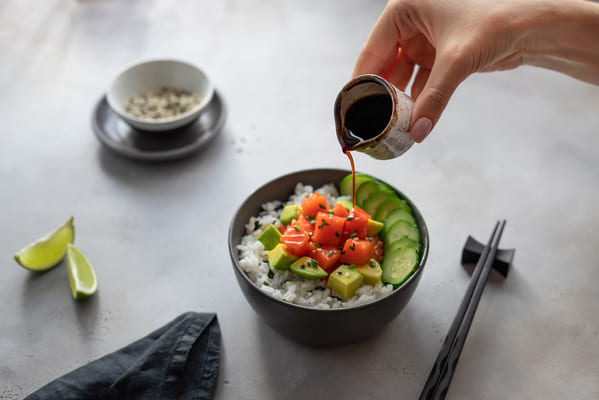Discover the Truth – Is Soy sauce Keto? Unveil its Carb Content, Potential Impact on Ketosis, and Low-Carb Alternatives in our Comprehensive Guide.
Is Soy Sauce Keto Friendly?
✅ YES! It can be considered keto-friendly when consumed in moderation due to its relatively low carbohydrate content.
If you’re following a ketogenic diet or considering adopting one, you may have come across conflicting information about the compatibility of soy sauce with this low-carb eating plan. In this blog post, we will look into the details to understand whether is soy sauce keto and is it suitable for consumption while following a keto diet.
The high-fat, low-carbohydrate diet, commonly known as the keto diet, aims to put the body in a metabolic state called ketosis. This state primarily burns fat instead of carbs for energy. Therefore, people who follow a keto diet are careful about their carb consumption and try to limit it to maintain ketosis.
Soy sauce, a staple in many cuisines, has garnered attention in the keto community due to its ubiquity and potential impact on carbohydrate intake. Soy sauce is a kind of condiment that is made by fermenting soybeans and, in traditional variations, wheat, water, and salt. Due to its unique umami taste and the ability to increase the flavor of different dishes, it is widely used for marinating and seasoning.
However, soy sauce’s compatibility with the ketogenic diet has been questioned because it contains carbohydrates, which could disrupt ketosis. Furthermore, concerns have arisen regarding added sugars in some commercial soy sauce brands, potentially making them unsuitable for those on a keto diet.

To clarify the topic “Is soy sauce keto,” we will explore the carbohydrate content of soy sauce, examine the presence of added sugars, and assess its impact on ketosis. Additionally, we will discuss keto soy sauce alternatives and offer recommendations for using soy sauce in moderation while adhering to a keto eating plan.
By the end of this comprehensive guide, you will have the information necessary to make informed choices about incorporating soy sauce into your ketogenic lifestyle. So, let’s dive in and uncover the truth about whether soy sauce is keto-friendly or not.
Table of Contents
- What is the Ketogenic Diet?
- Importance of Condiments and Other Added Spices in the Topic “Is Soy Sauce Keto?”
- Is Soy Sauce Keto Friendly?
- Is Soy Sauce Keto? Factors to Consider
- Is Soy Sauce Keto? Low-Carb Alternatives
- Final Thoughts
What is the Ketogenic Diet?
The ketogenic diet, often called the keto diet, is a low-carbohydrate, high-fat eating plan that has recently gained significant popularity. It is designed to shift the body’s metabolism into a state called ketosis, where it primarily utilizes fat for energy instead of carbohydrates.
Limiting carbohydrates depletes the body’s glycogen stores, decreasing blood sugar levels. As a result, the body begins to break down stored fat into molecules called ketones in the liver. These ketones are an alternative energy source, fueling the body and the brain.
The ketogenic diet typically consumes around 70-75% of calories from fats, 20-25% from protein, and only 5-10% from carbohydrates. This macronutrient composition is intended to induce and maintain a state of ketosis.
Importance of Condiments and Other Added Spices in the Topic “Is Soy Sauce Keto?”

Every meal component becomes crucial when following a restrictive diet like the ketogenic diet. Condiments and added spices can play a vital role in enhancing the flavors of dishes, making them more enjoyable and satisfying. While they may seem inconsequential, it’s essential to be mindful of their ingredients and potential impact on carbohydrate intake.
Condiments like soy sauce, for instance, are widely used for their distinct taste and ability to elevate the flavors of various dishes. However, certain condiments, including soy sauce, can contain carbohydrates, sugars, or other ingredients that might impede ketosis if consumed excessively.
Understanding condiments’ nutritional composition and potential effects is essential for maintaining the desired macronutrient balance on a ketogenic diet. By being aware of the carbohydrate content and any hidden sugars in these condiments, individuals can make informed decisions about their use while staying in ketosis.
In the case of soy sauce, knowing its carb content, the potential inclusion of added sugars, and keto soy sauce alternative with lower carbohydrate profiles can help individuals on a keto diet make suitable choices that align with their goals and dietary requirements.
Being informed about the ingredients and nutritional aspects of condiments ensures that individuals can enjoy flavorful meals while staying within the parameters of the ketogenic diet. It empowers them to make conscious decisions about their food choices, enabling them to maintain ketosis and reap the potential benefits of this low-carb eating plan.
Is Soy Sauce Keto? – Its Common Uses
Soy sauce is a fermented condiment that originated in East Asia and has become a popular ingredient in many cuisines worldwide. It is made from soybeans, water, salt, and often wheat (in traditional varieties). The soybeans undergo fermentation, contributing to the sauce’s rich, umami flavor.
Soy sauce is renowned for enhancing the taste of a wide range of dishes. It is commonly used as:
- Teriyaki Sauce
- Noodles
- Sushi Sauce
- Dippings
- Additional Spice and more
Nutritional Composition of Soy Sauce

Carbohydrate Content
When considering soy sauce’s compatibility with the ketogenic diet, examining its carbohydrate content is essential. While soy sauce does contain carbohydrates, the amount present can vary depending on the brand and type.
Carbohydrates in soy sauce primarily come from the wheat used in its production. However, some gluten-free variations use alternative ingredients like tamari, soy sauce made without wheat.
To maintain ketosis, it is crucial to monitor and limit carbohydrate intake. While soy sauce may have some carbohydrates, the quantity consumed in typical serving sizes is tiny. Nevertheless, these carbs should still be accounted for when calculating daily carbohydrate allowances.
Potential Presence of Added Sugars
Another factor to consider when assessing soy sauce’s compatibility with the ketogenic diet is the potential presence of added sugars. Some commercially available soy sauces may contain sweeteners or other additives, which can increase the carbohydrate content.
You must check your soy sauce’s ingredient list and nutrition label to ensure it aligns with your dietary goals. Opting for brands that do not include added sugars or choosing tamari sauce (gluten-free soy sauce) can be a suitable alternative for those following a keto diet.
Analyzing the Ingredients in Soy Sauce
Besides carbohydrates and added sugars, it is worth analyzing the ingredient list of soy sauce to identify any potential non-keto ingredients that might be present.
Individuals following a strict ketogenic diet must be mindful of ingredients like hydrolyzed vegetable protein (HVP) or caramel color, as they could contain hidden carbohydrates. Some soy sauces may also include preservatives or artificial flavorings that may not align with a clean, whole-food approach.
By carefully reading labels and selecting soy sauce brands that prioritize simplicity and natural ingredients, individuals can make more informed choices that support their keto journey.
Is Soy Sauce Keto Friendly?

Net Carbs vs. Total Carbs in Soy Sauce
To determine the keto-friendliness of soy sauce, it is essential to understand the concept of net carbs. Net carbs refer to the total carbohydrate content minus the fiber and sugar alcohols, as these components have minimal impact on blood sugar levels.
While soy sauce contains carbohydrates, the amount of net carbs can be relatively low due to fermentation, which can break down some carbohydrates. The net carb content of soy sauce is typically lower than the total carb count on the nutrition label.
Individuals can make more accurate assessments of soy sauce’s impact on their ketosis by calculating the net carbs rather than relying solely on total carbs.
Can Soy Sauce Kick You Out of Ketosis?
Consuming soy sauce in moderation is unlikely to kick you out of ketosis, especially if you consider the net carb content. The carbohydrate content of soy sauce is typically low, making it suitable for most individuals following a ketogenic diet. However, everyone’s body may respond differently, so monitoring your ketone levels and adjusting accordingly is essential.
Is Soy Sauce Keto? Factors to Consider
While soy sauce can be enjoyed on a ketogenic diet, there are a few factors to consider:
- Portion Control: Although soy sauce may have minimal net carbs, portions should be moderated to avoid excessive carbohydrate intake. Tracking your consumption and staying within your daily carbohydrate limits is crucial for maintaining ketosis.
- Added Sugars and Non-Keto Ingredients: Some commercial soy sauce brands may contain added sugars or non-keto ingredients. Checking the labels and choosing soy sauces without added sugars or gluten-free tamari sauce can be safer for those following a keto diet.
- Individual Sensitivities: Some individuals may have sensitivities or allergies to soy or gluten, which can be present in traditional soy sauces. In such cases, gluten-free tamari or coconut aminos can be a suitable alternative.
- Variety of Soy Sauce: Various types of soy sauce are sold, such as light, dark, and low sodium soy sauce options. Each type may have a distinct flavor and varied levels of sodium. To enhance your keto experience, choosing foods that match your taste preferences and dietary needs is essential.
Individuals can enjoy its flavor-enhancing qualities by considering these factors and carefully incorporating soy sauce while maintaining their ketogenic state.
Understanding the carbohydrate content, net carbs, and potential impact on ketosis allows individuals to make informed choices when including soy sauce in their keto diet. Moderation, label reading, and individual considerations are critical in successfully incorporating soy sauce into a ketogenic diet.
Is Soy Sauce Keto? Low-Carb Alternatives

Coconut Aminos as a Soy Sauce Substitute
Coconut aminos are a popular low-carb alternative to soy sauce. It is made from coconut blossoms’ sap and is naturally gluten- and soy-free. Coconut aminos provide a similar umami flavor profile to soy sauce while containing significantly fewer carbohydrates. It is also rich in minerals and amino acids, making it nutritious.
Tamari Sauce and its Low-Carb Properties
Tamari sauce is a Japanese condiment that closely resembles traditional soy sauce. It is made from fermented soybeans and contains little to no wheat. Tamari is naturally low in carbohydrates and can be an excellent alternative for individuals following a gluten-free or low-carb diet. It offers a similar savory flavor to soy sauce and can be used in various recipes.
Comparing Taste and Flavor Profiles of Alternatives
When considering low-carb alternatives to soy sauce, taste and flavor profiles are essential. While coconut aminos and tamari sauce provide similar umami flavors, they may have slight differences that can impact the overall taste of a dish.
Coconut aminos have a milder and slightly sweeter taste compared to soy sauce. They offer a hint of natural sweetness and can be a versatile replacement in stir-fries, marinades, dressings, and dipping sauces.
On the other hand, tamari sauce resembles soy sauce’s taste but has a slightly richer and smoother flavor. It is often described as having a more full-bodied and less salty taste than regular soy sauce.
The choice between coconut aminos and tamari sauce ultimately comes down to personal preference and dietary needs. Experimenting with both alternatives can help determine which option best suits your taste preferences and fits well within your keto diet. You can buy most of this online or grocery shops like Costco and more.
Final Thoughts
So to answer the question, “Is soy sauce keto”? Soy sauce can be compatible with the ketogenic diet if consumed in moderation and with awareness of its nutritional content. While soy sauce contains carbohydrates, the net carb content is generally low, making it suitable for most individuals following a keto diet.
When incorporating soy sauce into a ketogenic diet, it’s essential to consider factors such as portion control, potential added sugars, and individual sensitivities. Monitoring carbohydrate intake and staying within your daily limits is crucial for maintaining ketosis.
Additionally, being mindful of alternative options like coconut aminos and tamari sauce can provide low-carb alternatives with similar flavor profiles to soy sauce. These alternatives can be valuable choices for those looking to minimize carbohydrate intake while still enjoying the taste-enhancing qualities of soy sauce.

Ultimately, the compatibility of soy sauce with the ketogenic diet depends on individual goals, preferences, and dietary requirements. By understanding the carbohydrate content, monitoring portion sizes, and making informed choices, individuals can incorporate soy sauce into their keto lifestyle while staying on track with their ketogenic journey.
It’s always beneficial to consult with a healthcare professional or registered dietitian to ensure your dietary choices align with your needs and goals.

